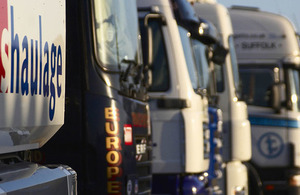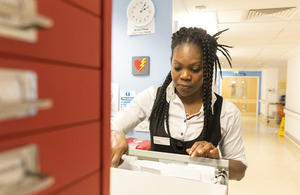The UK is leading the world in the fight against illicit finance, according to the Financial Action Task Force’s (FATF) report published today (Friday 7 December 2018).
FATF, the global standard-setter for anti-money laundering and counter-terrorist financing, gave the UK its highest possible rating for measures including how the UK tackles terrorist financing, and its use of financial sanctions against terrorists. This means out of the 60 countries assessed, the UK has one of the toughest anti-money laundering regimes in the world; stronger than any other country assessed to date.
John Glen, Economic Secretary to the Treasury and City Minister said:
There is absolutely no place for dirty money or the people that launder it in our country, so I am incredibly proud that today’s report confirms that the UK has one of the strongest regimes in the world for deterring these criminals.
Our law enforcement agencies and our regulators have done an exceptional job at bringing the fight to the terrorists and crooks, but there is always more we can do. That’s why we will continue to improve our defences and work with our international partners to find, disrupt, and prosecute anyone dealing in illicit money.
Ben Wallace, Minister for Security and Economic Crime said:
The UK has taken a leading role in the global fight against illicit finance. I’m delighted with today’s report which shows our efforts are being recognised, and sends a strong message to criminals that we will come for them, their assets and their money.
We will use all the powers and tactics we have, as set out in the new Serious and Organised Crime Strategy, to drive money launderers out of the UK and clamp down on those that threaten our security. The strategy sets out how we are working with the private sector, the public and international partners on our integrated and powerful response.
As one of the largest and most important financial centres in the world, it’s vital that the UK has the right controls to ensure that money passing through its complex financial system is legitimate. Other UK controls and practises praised within FATF’s ‘Mutual Evaluation Report’ include:
- aggressively investigating and prosecuting money laundering, with over 1,400 convictions a year, and adopting new tools such as Unexplained Wealth Orders
- using all means at its disposal to disrupt terrorist financing, including criminal justice measures (with over 100 convictions over the last three years for relevant offences), confiscating funds, and using financial sanctions
- preventing the misuse of companies and trusts, acting as a global leader by adopting a public register of company beneficial ownership and a register of trusts with tax consequences
- working with international partners to tackle illicit finance, through a strong legal framework and a liaison network spanning over 160 jurisdictions
To maintain its world leading status, the UK government is redoubling its efforts in the fight against economic crime by establishing a new unit within the National Crime Agency, focused entirely on fighting dirty money. The new National Economic Crime Centre (NECC) will for the first time bring together law enforcement agencies, government departments, regulatory bodies, and the private sector, to fight dirty money. It will have access to an expansive range of intelligence tools and capabilities to ensure economic crime is dealt with quickly and effectively.
The UK received the highest possible rating (“High level of effectiveness”) in FATF’s report in these areas:
- Taking significant steps to understand the threat of illicit finance, and coordinating responses to these threats (“Immediate Outcome 1”)
- Using all available measures to disrupt terrorist financing, including criminal justice measures, confiscating funds, and using financial sanctions (“Immediate Outcome 9”)
- Promoting effective global use of financial sanctions against terrorists and against proliferation of weapons of mass destruction (“Immediate Outcomes 10 and 11”)
The UK received the second-highest possible rating (“Substantial level of effectiveness”) in these areas:
- Working with international partners to tackle illicit finance (“Immediate Outcome 2”)
- Aggressively investigating and prosecuting money laundering (“Immediate Outcome 7”)
- Preventing the misuse of companies and trusts (“Immediate Outcome 5”)
- Confiscation of the proceeds of crime (“Immediate Outcome 8”)
The UK will report back to FATF in five years, and will set out its response to the recommendations in the FATF report in due course.
In addition, the government has already committed to:
- Regulating virtual currencies for AML/CTF purposes by the end of 2019, to tackle emerging risks in the sector
- Reforming the Suspicious Activity Reports (SARs) regime, to further improve the use of financial intelligence in the UK
- Taking appropriate action on mitigating the threats posed by limited partnerships, pending the outcome of a consultation by BEIS, and looking at controls over who registers companies in the UK, what information they have to provide, and how assurance is provided over that information
- Continuing the use of powers implemented under the Criminal Finances Act 2017, including Unexplained Wealth Orders to investigate suspicious financial activity in its fight against ML


